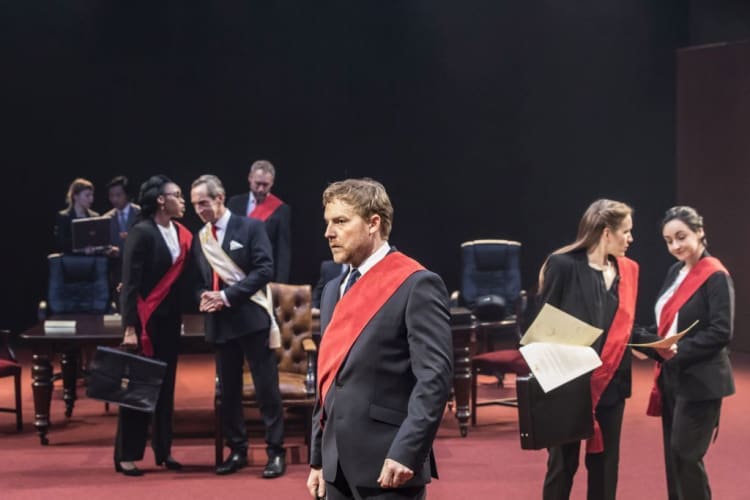Julius Caesar is Robert Hastie’s first production at the Sheffield Crucible since his appointment last autumn.
An interesting programme note points out it is "the play of the moment" exploring the thin line between strong leadership and tyranny, the power of populism and different versions of the truth or "fake news".
Hastie’s production is powerful, innovative and probably controversial. He opens up the whole of the vast theatre space and provides additional pathways through the audience for rioting crowds and battle scenes. This makes for exciting action but occasionally means that voices are less audible in quieter scenes.
This is not only a modern dress production but one which replaces the Roman forum with a contemporary council chamber—allocated seats, piles of paper, desk lights and so on. The rioting populace is one we are familiar with from news broadcasts and the armies are modern armies with machine guns and helicopter support.
The production also challenges assumptions about gender, so a play that usually has two female parts provides key roles for several women. Cassius is the most substantial of these roles, but other members of the conspiracy, Casca, Metellus and Trebonius, are also performed by women. I was entirely comfortable with this in the first half of the play since we are used to seeing strong women in important political roles. The women were less convincing once removed to the theatre of war.
What distinguishes the production is that every actor, including the members of the Sheffield People’s Theatre, who make up the crowd and play supplementary small parts, have thought through their characterisation in minute and convincing detail. This is particularly true of Samuel West as Brutus, making a welcome return to the theatre after his period as Artistic Director in the early years of the new century. West’s interpretation is complex and subtle, especially in the early stages of the conspiracy, when he agonises over whether Caesar’s assassination is essential for the health of the nation.
Zoe Waites is a charming but manipulative Cassius who knows exactly how far she can push Brutus while persuading him to lead the conspiracy. She turns out to be the better politician when she argues for the assassination of Antony as well, but Brutus is too ‘noble’ to go down that route. He shows equally bad judgement in allowing Antony to address the crowd after he has spoken.
Jonathan Hyde is effective as an autocratic, vain, slightly peevish, easily flattered Caesar who also displays bad judgement. His murder in the ‘council chamber’ stretches credibility somewhat. Where was the army of security guards we are accustomed to see surrounding any presidential figure? And it is not entirely convincing that most of the significant killings are carried out with small knives, though much is made of how difficult it is to hack through the body wall to achieve death.
The set piece forum scene is very exciting. Brutus addresses the crowd, Hitler-like, from a raised balcony beneath the emblem of Rome. West has the advantage of a microphone so his voice is clearly heard and resonant, and he deals masterfully with the rhetorical structure of the speech. In contrast, Elliot Cowan as Antony, addressing the crowd at ground level with only the coffin of Julius Caesar to aid him, weaves his way with much greater subtlety through the argument which gradually inflames the crowd and leads to the overthrow of the conspirators.
There is a great deal of interest in this production and the crowd and war scenes are thrilling.
